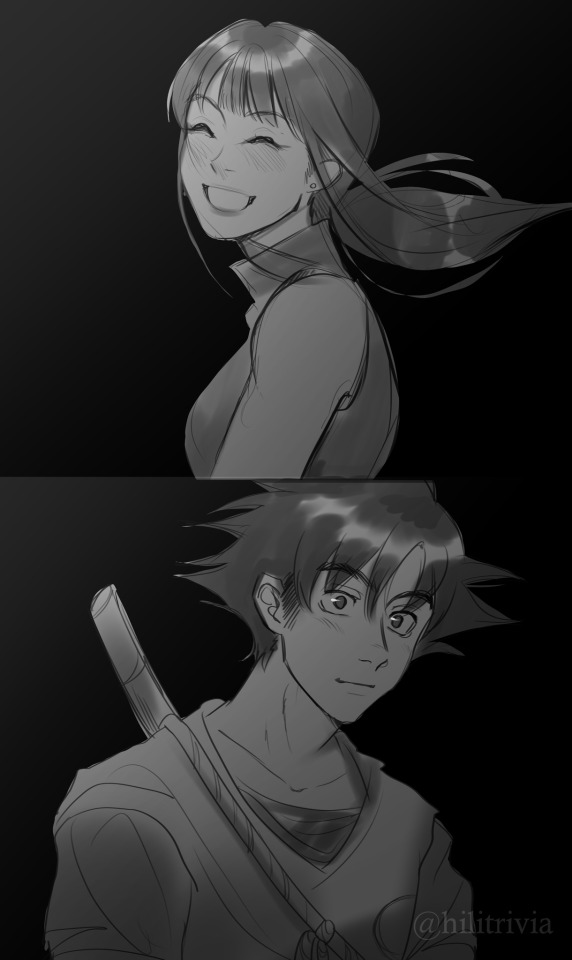I love you, I haven't sobered up yet ˚ʚ♡ɞ˚Oh, I need you, I haven't sobered up from love yet ~literally just a place where i do homework🌸
Don't wanna be here? Send us removal request.
Text
Trixie tidbits of lore
She wants to know everything about the world. To her, its double the size it is to a human and there's so much interesting trickets to collect and hoard. She wants to make her house (if she can go back home) a museum of everything from all around the world. She wants to document EVERYTHING.
Although naturally curious, Trixie has always been too afraid to venture out of her home. This is for many reasons.
Size: Because of how small pixies are, they're vulnerable to many things. This includes larger creatures hunting them or being more effected by the environment, like the rain. Raindrops typically are seen as a threat to most insects, often soaking their wings and making them unable to fly, or outright plummeling them. This is the same for pixies. Accompanied by strong winds that make it extra challenging, pixies avoid flying in this weather. This is also why Trixie hates the rain or anything wet in general, as she is unable to fly when soaked. She is paranoid about rain and being caught off guard by it, especially if flying over a large body of water (more likely to drown).
In addition, pixies are often sought out; either to be sold as prizes, to have their wings extracted, eaten, etc. She is terrified most of being eaten alive or losing her wings. This is why she learned to become a summoner even though its also in her blood (dragon ancestory), but she was never able to bring up the courage to leave even after learning. She just always figured she'd do it one day, that is, until she died from the Lich.
After dying and learning of her contract, Trixie decides she'll do whatever she wants until the mission is over.
0 notes
Text
PAPER OUTLINE
Introduction:
What is bleach painting?
Brief history of it (MAYBE)
Brief explanation of what it is
As the name entails, it's painting with bleach. Taking any textile you want (but what it's made of will determine how effective the bleaching is) and with a paint brush, start painting (there are more steps but I will explain them)
Inspiration... my personal, history... why did i do it...
Recently with the rise of Tiktok, I've been noticing more and more bleach painting videos come up on my feed. Many advertise it as a fun and easy craft that is safe, granted you aren't a child and won't inhale or drink too much of bleach. I've been eyeing it ever since my roommate and I went to a fair and passed by a bleach painted shirt with a ribcage. It caught her eye and she was tempted to buy it, but passed it up because it was too expensive. Originally when the project was given to us, I wanted to ceramic sculpture, only to remember how long and difficult the process was. But what wouldn
Materials
Fabric safe household bleach (find a specific brand, I don't think it matters but I'll do research)
Paintbrushes (also do research because brushes do get worn over time by bleach)
Fabric made mostly or entirely of natural fiber
Chalk (white colored pencil or white charcoal pencil works. Just anything that'll help you outline your design that you can wash off afterwards)
Water
Container (plastic, glass, ceramic etc)
Cardboard (or anything to stick beneath the material as you paint so it doesn't bleed)
Optional:
Measuring cup (to measure amount of bleach and water easier)
Gloves (if you don't want to get bleach on your hands)
A mask (if you don't want to breathe in the bleach)
Apron (to avoid mess)
YOU SHOULD DO THIS IN A WELL VENTILATED AREA, since you don't want to be stuck in a room that smells like bleach. You will hate it.
STEPS
YOU CAN JUST WATCH THIS VIDEO INSTEAD IF YOU DON'T WANT TO HEAR THIS YAP: How to bleach paint
Design. You should start by planning what you want on your shirt, this can be anything. For my shirt, I chose a simple skeleton ribcage as a start. There are many ways you can imprint your designs; you can use stencils to make things easier, you can trace your image and use transfer paper, or just free hand it. One piece of advice for picking designs is that chaotic or messy designs tend to be easier than simple or clean designs (this applies a lot to manga panels if you gear towards that), as it gives you more freedom to make mistakes and incorporate them into the design.
Diluting the bleach. The ratio and amount of variations depend on what you're trying to paint. This video does a good job at explaining how to pick color: https://practicalandpretty.com/paint-with-bleach-using-a-stencil/
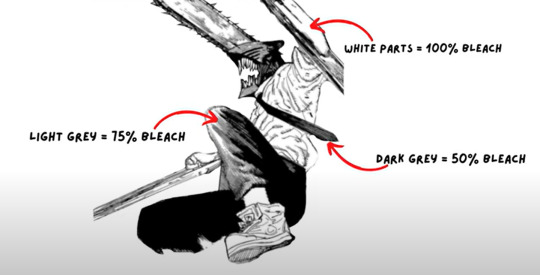
Here, you can see how she determines the ratio of water and bleach in terms of color. For the lightest parts, she goes for majority of bleach and dilutes less and less it when it comes to the darker colors.
However regardless of what strong you want the reaction, it's reccomended always dilute your bleach. This is because pure bleach is more likely to damage the fibers and may lead to holes.
3. Painting. Although it depends on how big your design is, I advice a finer brush than what you might've planned on using. This is because bleach tends to bleed, leading to it expanding and sometimes leaving a blobby look instead of what might've been a fine stroke. Tapping the brush after dipping helps remove excess liquid to avoid blobbing when you initally paint. Another difficult thing is that you need to go slow when painting. Your brush will dry out quickly, meaning you have to go back and rewet it multiple times. You also need to go slow and apply even pressure for a better look, and you can always go back for touch ups afterwards.
4. Rinsing and Washing. This may or may not be optional, sources seem to differ on their feelings. But you should give it rinse with cold water and let it dry, before washing it. Whether you wash it alone or with other clothes is up to you. To be safe, I would rinse it in cold water and then wash it alone before it ever gets mixed with my laundry (this might sound stupid BUT PLEASE MAKE SURE TO USE SOAP OR DETERGENT. FOR SOME REASON WHEN I DID THIS CRAFT, I FORGOT TO. SO NOW I LIVE IN CONSTANT PARANOIA ON IF ITS SAFE TO WEAR OR WASH WITH MY OTHER CLOTHES. GOOGLE HAS NO ANSWERS FOR ME)
5. Corrections (optional). If you're unhappy with any of the linework, you can go over with black fabric paint or even sharpie (or whatever color of the shirt you did, I did a black shirt because its the easiest)
MY PERSONAL CRAFTING PROCESS :3!
Despite my initial brief research into bleach painting, I did not follow these steps. These are all written after I learned from my mistakes, in which I have made many.
FIRST I began by designing.
SCIENTIFC EXPLANATION
Why does bleach remove color?
What is bleach
Composition of color dyes
Oxidation
Why do we dilute bleach?
How does H2O dilute bleach?
Why should we use natural fibers and not synthetic fibers?
REFLECTION
1 note
·
View note
Text
beautiful
Character Analysis: Rose Quartz

This was supposed to be an episode analysis for Mr. Greg, but I realised that I couldn’t even begin to talk about that episode without talking about Rose first. I think seeing the customary Rose photo shot in the episode was already a huge indicator of what kind of story we’d have in Mr. Greg. To understand what motivated both Greg and Pearl to act the way they did after all these years, we’re going to have to understand Rose.
1. Rose loves human beings, but knew nothing about them until Greg arrived
From what we’ve seen of Rose in Story for Steven, she has the air of someone used to being in power, being superior. Not only was she a leader both on Homeworld and on Earth, but she was also a very motherly figure towards the gems. When Greg first stumbles upon the fenced off area, the gems’ initial goal is to get him back over the fence, “as the sign says.” It was likely Rose’s decision to put up the fence and limit their contact with human beings, though.
Because Rose was always admiring and observing human beings from a distance. She says as much in the episode.
Rose: *sighs* You’re awfully cute… and I really wanna play with you, but your life is short and you have dreams. I won’t let you give up on everything you want.
Source: SU Wiki
And it’s easy to dismiss that as Rose looking down on human beings. But let’s take some perspective here. Rose was likely one of the gems in the fusion that led Captain Dewey to Beach City as was seen in Historical Friction. And even if she weren’t one of the fusion components, she would still have authorised or have been informed of it. This is a significant scene, because Rose makes a good point. She has never connected with human beings at a level considered genuine because to her, they’re young and still have a ways to go. From her perspective, their lives as a species has only just begun. Captain Dewey’s expedition is very similar to those in the Age of Exploration. Rose was around since before that.
We have relatively short lifespans. When you live as long as Rose has, you start to see patterns; you see people and history repeat itself. You start doubting whether you can still connect to these people, each one entering the world with so much hope and promise.
Look at how specifically she mentions Greg’s dreams, because in comparison, Rose had become rather jaded. She fought a war on a scale human beings can only imagine. She’s been through so much and lost her home. And that was years ago. She no longer believes she can make real connections with human beings, and that leads her to not try. And that’s specifically where people got the feeling she thought human beings were inferior to gems.
It’s very similar to an older person complaining about “kids these days” not understanding how difficult life was in the past. Granted, their experiences are different, but it doesn’t mean both parties can’t try to understand each other.
Under all of that though, Rose does want to love and to be loved. She wants to make connections. She’s just not great at it. Take this scene from We Need to Talk:

Greg: I’m starting to wonder if you… respect me?
Rose: Oh, you’re hilarious, Mr. Universe. *continues laughing*
Greg: Rose, please! (Rose continues laughing.)
Greg: Can you just- (Rose continues laughing.)
Greg: Talk to me for one second, like a real person!?
Rose: … I’m… not… a real person… I thought… haven’t we… is this not how it works?
Source: SU Wiki
All this time, Rose has been acting like what she thought Greg would like: A human woman. She’s been laughing at all his “jokes,” complimenting him, and all the other things a human being purportedly does. And she’s no stranger to human men. In Mr. Greg, Pearl notes explicitly that there were other men in Rose’s life. Rose says so herself in We Need to Talk; she’s loved other humans before.
But the reason Greg stuck and the others didn’t? Greg got her to open up and be real. He didn’t want the human woman Rose was trying to be. He wanted to be with Rose, the giant pink haired lady who was enthralled by his music.

It’s easy to simplify romantic relationships if you’ve never actually been in one. You do certain things together and say the right things, and from an outsider’s perspective, you’re in a relationship, right?
That’s what Rose thought. She loved human beings. That’s for certain. She protects their planet; she helped them out when they needed it, just as she did Captain Dewey when he was lost at sea. Remember, Rose doesn’t want to interfere and involve herself and the gems in their lives. That’s why she put up the fence.
She believes in the importance of individual experiences and decisions. In The Answer, she tells Garnet never to apologise for fusing, and asks about Garnet’s experience, despite inter-gem fusion having many societal ideas attached to it.
Watching human beings from afar has given her the idea of what human beings are and what they do, but not really. It’s all appearances. Because of Greg, she started to make a real connection and the distance between them was closed.
Because of the circumstances that brought them together, mentioned above, I understand that there may be some doubt as to whether Rose really wanted to be with Greg specifically, or whether she chose him only because she finally got to open up to someone, and that leads to the next idea.
2. Rose truly loved Greg

Keep reading
2K notes
·
View notes
Text
TO DO THIS WEEKEND
Study for exam on 10/17
Sculpt
Self analysis
Homework for math by 10/13
TO DO TONIGHT
Chem homework 1
Math homework
1 note
·
View note
Text
DRAFT OF SOMETHING MESSY ICK!
There was also an issue that before bed or while I was trying to sleep, I had to get up frequently to pee. My bladder seemed as if it was constantly full, always keeping me awake and only allowing relief if I went to the bathroom. I found the whole ordeal embarrassing as I had just met my roommates at the time and didn’t want them thinking weirdly of me. Already from this paragraph alone, there are two concepts we can identify. One is the social psychology and the biological function of the brain for why I felt embarrassed around my frequent trips to the bathroom. To begin, let’s examine the biology, that way we can understand the scientific explanation for specific reactions.
The brain is made up of many systems and functions. The limbic system, which is connect to the temporal lobe of the brain, is the main focus when it comes to emotional and behavioral responses. It also includes survival aspects. It's primarily made up of four central parts; the amygdala, hippocampus, thalamus, and hypothalamus. This system is a crucial part for how I view things, as the thalamus is responsible for relaying sensory information to the appropriate parts of the cortex. That would include social perception, as I would be aware that I am not alone in the room. As my brain processes this fact, it would trigger an emotional reaction. This leads into the amygdala is the part of the brain that detects stress and is responsible for emotional responses. In this case, I would become embarrassed by the fact that I’m peeing so much and my roommate likely is catching onto its frequencies.
But why am I bothered so much by what others might be perceiving? It could be that it connects with the limbic’s systems survival instincts, but this is also where social psychology comes into play. This specialization is the focus on interpersonal dynamics and how social interactions affect a person’ s psyche. This can range from how a person’s thoughts, feelings, actions are influenced by others. In this case, my feelings towards my issue is embarrassment because I do not want strangers to perceive me as odd. I am aware that leaving the room more than three times within an hour is out of ordinary, and this triggers (insert biology thing) and makes my cognition decide that in order to downplay the severity of my bladder, I will hold it in so they don’t notice.
So that covers how my peeing issue makes me feel when it comes to how others might perceive me, but how does it affect me physically?
0 notes
Text
saving for future pfps IGNORE
character with shark teeth >>>
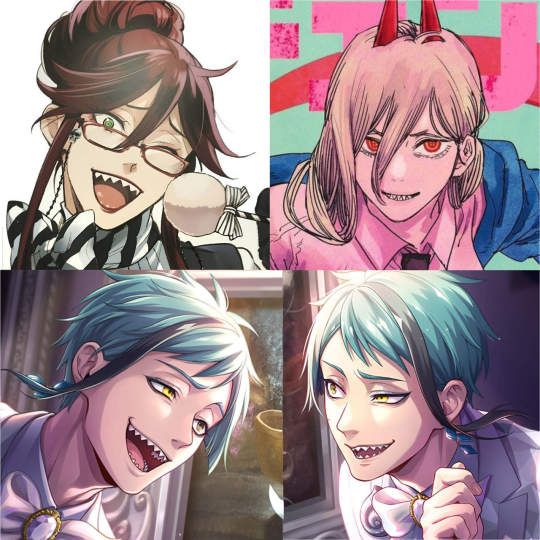
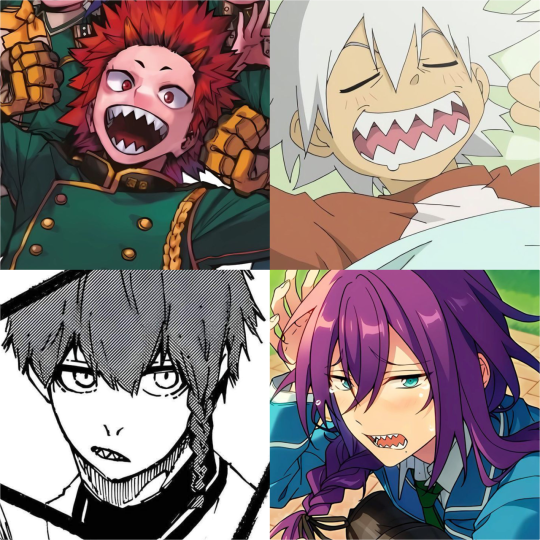


588 notes
·
View notes
Text
Sleep
My body will wake up multiple times throughout the night to pee:
Basic overview:
I wake up multiple times to pee
Once during the middle of the night (after the most hours), then more frequently towards the more (the segments where I get sleep get shorter and shorter)
Effect on me: I am more tired, my memory is worse, I am more impatient/irritable, I have a harder time learning or listening/retaining information
Possible solutions: Drink less water before bed, sleep earlier (to get more sleep), try to sleep after waking up (so my body doesn't get used to it)
Concepts:
Sleep stages/cycles and the effect of REM deprivation
Correlations: What exactly is causing me to wake up? Every time I wake up is to pee, so peeing is correlated with waking up multiple times. Therefore, I can reason that urinating might be the issue. But there could be other factors; I might wake up because my body is use to it, or I had a bad dream, and urination is simply a consistent pattern because I woke up after holding it. OR the amount of water I drink or when I drink it affects my frequency/amount of urine
Health Psychology Specialization: How is bad sleep effecting my mental health? (irritable moods, bad memory, etc)
Cognition: Assuming that this is urine based, I can try drinking less water before I go to sleep. If this is my body, I can take sleeping pills to help sleep better and maybe keep me asleep. I can try sleeping after I wake up to adjust my body from waking up.
ORDER OF CONCEPTS: I GUESS
HOW DOES WAKING UP SO MUCH EFFECT ME?!
Physical/mental
Sleep stages
Health Psychology Specialization: How is bad sleep effecting mental health
Emotional/social
Brain and it's perception
Cognition
WHAT IS CAUSING ME TO WAKE UP SO MUCH??
Correlations
WHAT CAN I DO TO SOLVE THIS?!
Cognition
0 notes
Text
DEEP DIVE
As we worked through the Blacksmithing module, we started with questions inspired by the craft. Those questions led us to need to understand certain scientific principles (temperature, heat capacities, etc.) so that we could better explain the actions and choices of a smith. We also developed a methodology to answer one type of question with original data.
Write for at least 10 minutes about how our learning process in the first module compares to what you are used to in other academic classes and disciplines.
Questions to Answer In This Deep Dive
What are some of the key things you note about scientific thought?
How does a physical scientist approach learning about a real-world activity like Blacksmithing?
Because reflection is about recognizing your growth and development, compare your view now to what you wrote on the first day of this class. How have you changed in your ability and willingness to be a critical observer, and to be curious about the reasons that everyday objects like kitchen knives or coffee mugs have the properties they do?
If you see no growth, why not, and what will you need to do in order to experience growth? If you do see an evolution in your thinking, how has it changed and what experiences (in class or out of class) helped that change?
0 notes
Text
AZALEA!!!!
Craftsmen family: Growing up in Standoria, Azalea was surrounded by all sorts of crafts. Whether that be while she was walking down the streets and seeing what merchants had in store, or helping out back at home. Both her parents are craftsmen and utilize their respect magic with their craft; her father in earth and her mother in fire. Their crafts range from forging and blacksmithing to glass blowing and clay.
She was a born a year after her brother, X, and the two of them were inseparable, hardly seeing either as the younger/older sibling due to the age gap. Both of them would learn side by side with their parents on their art as well as magic. X took on earth and Azalea with fire. As they grew older and more skilled, they were even able to make their own pieces and sell.
Although they were hesitant about sending their daughter away, they didn't want to stand in the way of her dreams and agreed to let her train to become an adventurer. Her first weapon was a bo-staff crafted by her parents (as they found that to be the safest), but Azalea later altered that into a staff, as she found a staff to be lame ('It's the same as a stick!')
0 notes
Text
BEHAVIORAL PROBLEM IDEAS:
Procastination
Stress (therefore unmotivated)
Bad self control/study habits
Waking up in the middle of the night
Body functions
Body habits?
Stress?
Social anxiety
I find old hobbies (art) to be boring
I cry when I get too angry?
Short attention span (I jump from task to task)
THIS ISNT HARD, THIS IS A FUN EASY PAPER!!!!!!!111
Find 6 concepts and just apply them, nothing to stress about
0 notes
Text
OWL ASSIGNMENT
Temperature:
The measurement of heat (kinetic energy) in an object (intrinsic)
Thermal equilibrium: The temperature by which they are no longer transferring any net energy to one another (aka they're at the same temperature)
A collision between a high energy molecule and low energy molecule will result in the transfer of energy (the high will give some to the low, aka heat transfer)
Heat: The transfer of energy (extrinsic)
Specific Heat:
The amount of heat per unit of mass required to raise the temperature by one Celsius (does not apply to phase change)
Formula:

The specific heat of water is 1 calorie/gram °C = 4.186 joule/gram °C
0 notes
Text
Blind spot (what is it, why it exists)
Correlations (positive versus negative, interpreting a correlation, correlation coefficients,
limitations)
Experiments (hypothesis, independent and dependent variables, control group, random
assignment)
Face blindness
Gestalt principles of organization (similarity, proximity, closure, simplicity)
How SSRI drugs work
Limbic system (what it is, major functions)
Lobes of the brain (their names, where they are, major functions associated with them)
Major brain structures and their major functions
Major divisions of the nervous system and what they do (somatic/autonomic,
sympathetic/parasympathetic)
Major perspectives on psychology (psychodynamic, cognitive, behavioral, neuroscience,
humanistic)
Major structures of the ear and their functions
Naturalistic observation (what it is, contrast it to experimentation)
Negative afterimages
Neuron function (action potential, all-or-none law, importance of the synapse, reuptake,
inhibitory and excitatory messages)
Neurons (major structures and their functions, presynaptic versus postsynaptic, mirror neurons)
Neuroplasticity
Neurotransmitters (what they are, names of major ones, what major disorders are associated
with specific ones)
Psychological specializations (clinical, counseling, health, developmental, social, etc.)
Rods and cones (major differences)
Scientific method
Split-brain research (major findings)
Top-down and bottom-up processing
Visual processing (fovea, retina, rods and cones, bipolar and ganglion cells, optic nerve, optic
chiasma, theories of color vision, primary visual cortex)
1 note
·
View note
Text
TO DO BY SUNDAY 9/15
HW 1.5-1.6
HW 1.8
Mini Quiz 1.8
Packback #2
0 notes
Text
To do
To do by 9/8
HW 1.1 ✔️
HW 1.4 (9/10)✔️
Mini Quiz 1.1✔️
Mini Quiz 1.4 (Do once lecture gets released to see if we missed anything)✔️
Reflection Journal (draft, just needs to be submit by Sunday)
Pack back question#1 (Do tonight) ✔️
Pack back response ✔️
Buy art materials (Before 9/8)
To do by 9/11
Mini quiz 1.5 and 1.6
HW 1.5 and 1.6
To do by 9/12
Properties exploration activity
0 notes
Text
Reflection Journal 1
What do you think of when you hear "Craft?" What do you think of when you hear "Science?"
When thinking of craft, my mind tends to gear towards arts and crafts (its in the name after all). I think of simple things for kids like paper based projects (ex: paper cut outs or figures) or stick art. Only when I think more deeply do I broaden it down to things like pottery or wood working, crafts that can be considered a career. None of those align to what I visualize when it comes to science; my mind jumps right into a chemical lab or biology.
What similarities and differences to you see between the "Craft" and "Science" perspectives?
At first they seem completely different from one another, but when actually trying to think of reasons why they are, I realize there isn't. Both require a lot of critical thinking and understanding of the medium. For crafts, you have to understand what material you're working with. Although I'm not super into pottery, I do understand the type of clay matters. The properties that go into them shape how you work with them or the result you get. For example, some clays might require a kettle in order to dry whereas others do not. Others might be more durable or more flexible to mold, therefore a potterer would have to think critically about what materials he'll be using for what he wants to make. The same applies to a scientist; they would have to be careful on what chemicals to mix to get the desired result. In general, there is a science to everything, so it's unavoidable when it comes to similarities.
Its correlations like these that make me believe in the importance of craft to teach science, because I believe it'll help non-science people like me learn and gain an interest in the subject. While I am no potterer or craftsmen of any sorts, I do have an interest in art. I find myself to enjoy doing things with my hand more than listening to someone talk about a subject I hardly know about or care for. So by overlapping it with things like blacksmithing or glassblowing, my interest automatically gets piqued. Even people who aren't into art likely would be interested in learning or watching someone blow glass or sculpt a pot. And by overlapping that with science, which basically is explaining the process to the craft, it'll likely stick with people.
What I'm hoping for that by the end of class, I'll have learned something and that it sticks with me. I've never been big into science and I can hardly recount anything that I've learned in that topic over the years. But if I'm in a class where I'm being taught something that involves art or my hands, I'm hoping that the scientific knowledge behind my materials or methods will stick with me.
Based on class discussion, how much overlap is there between my goals for this class and yours right now?
What value do I (Justin) bring to a class like this, based on my history and cares and interests?
What value to you bring to this class, based on your history and cares and interests?
“Why use the activities of Craft – in particular, things like pottery and brewing and blacksmithing – to learn science?”
0 notes
Text


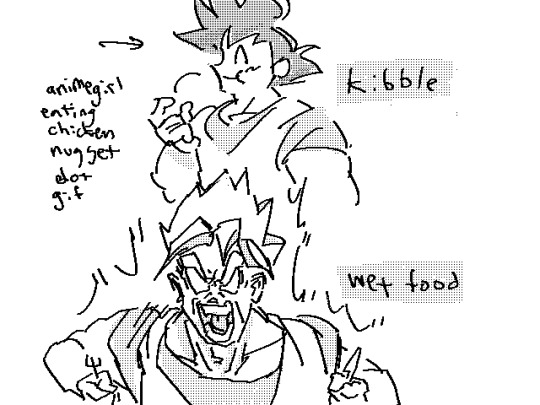
wha huh goku family sillies. i love them a lotttt ouuuouououauaaaahahuuu baby gohan staring at goku with a deep focuz only toddlers can summon................
770 notes
·
View notes
